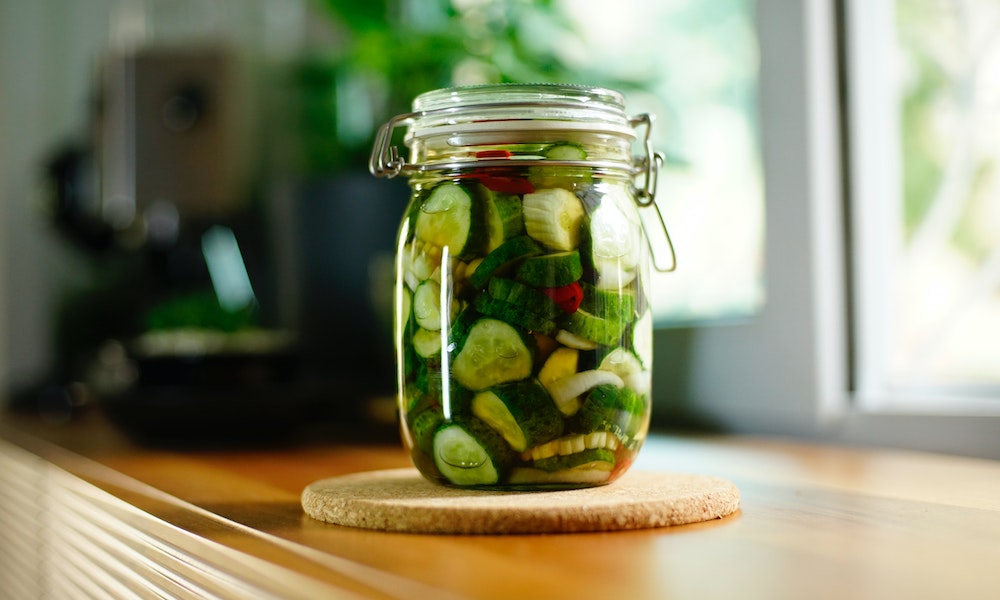Every year, an eye-watering one-third of all food produced globally goes to waste. In fact, if food waste was a country, it would be the third biggest emitter of greenhouse gases after the USA and China! This astounding amount of waste has far reaching consequences; it contributes to greenhouse gas emissions, strains natural resources, and exacerbates hunger and poverty.
With International Day of Awareness of Food Loss and Waste around the corner, now is a great time to implement some simple strategies to reduce your home food waste and contribute to a more sustainable and equitable world.
Here are eight ideas to help!

1. Optimise storage conditions
Proper food storage is an essential element in the battle against food waste. Different foods have different storage requirements, and knowing them can significantly extend the lifespan of your groceries. For instance, fruits like apples and bananas should be stored separately because apples release ethylene gas, which can cause bananas to ripen too quickly. Root vegetables like potatoes and beets need a dry, dark place with some ventilation (not in a container!) to keep them from sprouting prematurely. On the other hand, leafy greens stay crisp when wrapped in a paper towel inside a plastic bag, while anything with a stem (celery, herbs, kale, etc) can be kept fresh in a jug of water, just like flowers! When it comes to packet foods like chips, biscuits and bread, pegs are a super easy way to seal and prolong their life. The key is to remove as much air as possible and then clip or tie to seal.

2. Regrow scraps
Aside from reducing waste, regrowing scraps is a fun and cost-effective way to enjoy an ongoing supply of fresh produce! Some vegetable scraps, such as spring onion roots, lettuce cores, and potato eyes, can sprout into new plants. Instead of tossing out the root ends of spring onions, place them in a glass with a bit of water and watch them regrow. Do the same with the base of celery and plant it out in the garden when it starts to grow leaves. Similarly, you can dry out a potato peeling (as long as it has an eye), plant deep in soil eye side up, and enjoy a new potato in a few months!

3. Pickle sad looking veg
Pickling is a time-honoured technique that not only preserves vegetables, but enhances their flavours! When you find yourself with an abundance of vegetables on the verge of becoming limp, consider making homemade pickles. Cucumbers are the classic choice, but you can pickle almost anything: carrots, cauliflower, radishes and even green beans. The process involves submerging the veggies in a brine made of water, vinegar, salt and spices then letting them sit for a period of time. The result? Tangy, crunchy pickles that are perfect for snacking or as a tasty addition to sandwiches, salads and other meals.

4. Store jars upside down in fridge
Here's a nifty trick to reduce the chances of mould forming inside your stored jars: flip them upside down. When you store jars this way, you create a natural barrier against mould growth because air, which mould needs to grow, struggles to penetrate the seal. This method is particularly useful for items like jams, sauces and salsas. Just remember to ensure the lid is on tight!

5. Transform peels into chips
Why would you toss your vegetable peels when you can turn them into crispy chips?! This ingenious idea not only minimises food waste but also provides a healthier alternative to store-bought snacks. Simply wash and thoroughly dry your potato or carrot peels, toss them in a bit of olive oil, sprinkle with your favourite seasonings (like salt, pepper, or paprika) and bake until they're golden and crispy. You'll be amazed by the flavour and crunch you can achieve from what would otherwise be considered a scrap!

6. Freeze fruits and vegetables
Freezing is a powerful tool in the fight against food waste. It's also a simple and effective way to preserve the freshness and nutritional value of fruits and vegetables. For instance, you can freeze whole or sliced ripe bananas (skin off!) in a container or glad-bag for future smoothies or baking. As outlined in our article on ways to use up excess citrus, lemons, limes, oranges and most other citrus freeze really well, either whole or as juice. Similarly, you can blanch and freeze vegetables like broccoli, cauliflower, beans and even capsicum to lock in their nutrients and flavours for later use.

7. Breathe new life into old veg
When your vegetables start to wilt or go limp, don't give up on them just yet! This trick can work wonders, especially for veggies like celery, lettuce, and carrots. Fill a bowl with cold water and add the limp vegetables. Let them soak for about half an hour, and you'll notice a significant improvement in their crispness and texture. This technique rehydrates the cells and revitalises the vegetables, making them suitable for salads, stir-fries or snacking. Just make sure there are no signs of mould or rot beforehand. For a flavour sensation, use limp veg, herbs and scraps to make stock! We like to keep onion peelings, carrot skins, parsley stalks and celery leaves in a bag in the freezer, and when it’s full, bung it into a pot of water and boil it into a delicious stock.

8. Embrace meal planning
Not quite as exciting, but an important strategy to minimise your food waste is to plan your meals each week. The concept is simple: sit down and plan your breakfast, lunch and dinner for the week ahead, factoring in meals out and potential leftovers. Once you’ve created your list, stick to it! This way, you'll buy only what you need and avoid impulse purchases that often lead to food spoilage. While on the topic of avoiding impulse purchases, always have some food in your belly before going to the shops or your grumbly stomach might lead to some rash decisions!
Food waste is a global problem, but the solution can start at home. By implementing these tips, you can make a positive impact on the environment and contribute to a more sustainable future. Remember, every small effort counts, and collectively, we can make a significant difference. Let's honour the upcoming International Day of Food Waste with a commitment to change our habits and reduce food waste for a better world.



